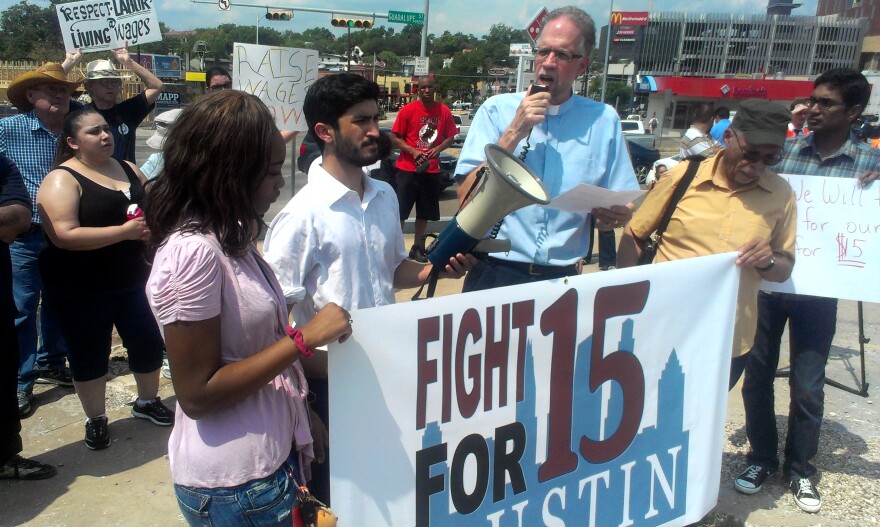Texas Matters: The United States is ranked next to Iran and Hungary in maternal death rate worldwide, a surprising position for a country proud of its modern medicine. So what is causing this and what can be done to make birth safer for women and babies? Also on this show: Fast-food workers protest for increased wages and an Austin couple is appealing the ruling in their "satanic ritual" case.
What can be done to improve birth safety?
On Labor Day, protests will be held around the nation and here in Texas over what’s being called "an American maternity crisis." The 2013 Rally to Improve Birth is looking to spotlight the fact the U.S. ranks 45th in the world for fatal outcomes in child birth -- for either the child or the mother.
According to the UT Health Science Center-San Antonio, Texas women died in childbirth at a rate of 24.6 per 100,000 in 2011. Experts say Texas should only be seeing about five deaths per 100,000.
Tiffany Hartnett, a San Antonio birth doula who advocates for safe and healthy births, is organizing the local Rally to Improve Birth.
"Some will point to the older more obese, less-healthy moms as the reason [for a higher number of fatalities], but research shows that the most variability in rates is really among low-risk moms. So The Joint Commission, which is the accrediting body for hospitals, recently pointed to physician factors...as the driving force in these differences. And the more you dig into the research the more you will see that the overuse of unnecessary medical intervention is absolutely what is leading to the complication and death and harm of these mothers and babies... Just because the mother is obese or diabetic or older doesn't mean she is going to have a complicated birth."
Learn more about the protests at: rallytoimprovebirth.com
Also on this episode of Texas Matters:
Fast food and slow money
The minimum wage in America is $7.25/hour and on Thursday fast-food workers in Texas and across the nation staged a dramatic strike to demand higher wages -- they would like $15/hour.

Greg Lee currently works at a Long John Silver’s fast food restaurant but said he has a culinary degree and used to work on the line at GW Fins and Dickie Brennan's Bourbon House in New Orleans. When he was evacuated to Austin he could not break into a good job.
"Don't get me wrong, we make the jobs look easy. You drive up to the window, you get your food, but what's going on in the back of the house is a lot of hard work that people take pride in doing... There are people back there that have families, that's raising families. Me, myself, am raising children and I'm almost a grandparent, and I am a provider and I'm trying to do the best I can the right way. So why not make a good salary doing it?"
Richie Jackson is the CEO of the Texas Restaurant Association and said paying the workers $15/hour isn’t economically feasible for the fast food industry.
"It's a little bit of a misnomer to say that wages are at minimum wage. I think minimum wage is really a starting wage in our industry. It is where workers may come in when they don't have skills that they need to command a higher wage and we are the industry that provides those skill sets so they can go on and earn a living. If you look at the restaurant industry, I think 50 percent of all adults have worked in the restaurant industry at some point in their life and one in four in the workforce got their first job in the restaurant industry."
Texas couple appeals sentence for 'satanic ritual abuse'
Twenty one years after being convicted on child sex abuse charges, a couple from Oak Hill, a community in Southwest Austin, are asking a judge for a new trial.
The couple were sentenced to 48 years each for multiple abuse charges involving satanic rituals, human and animal sacrifice in and around the day care center they ran from 1987 until 1991.
But now some of the evidence used to convict them has been called into question and some witnesses have recanted their testimony. From KUT Austin, Karen Bernstein reports.



